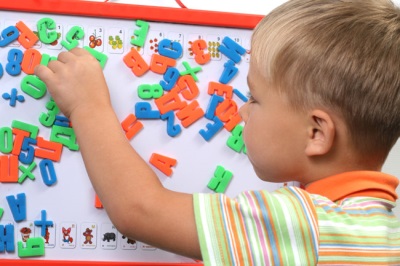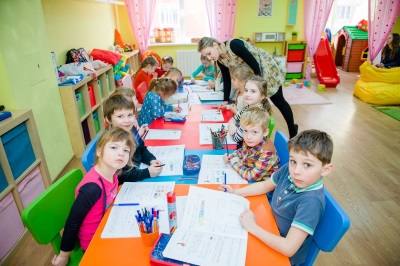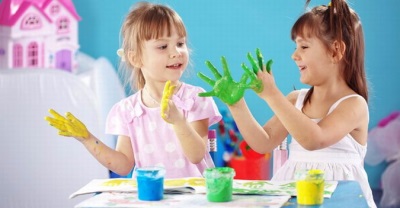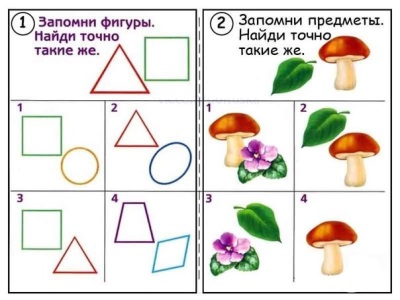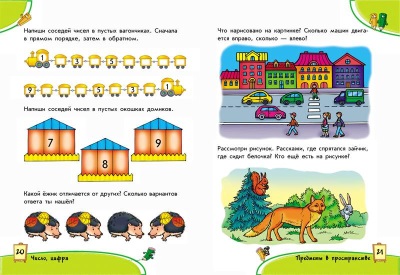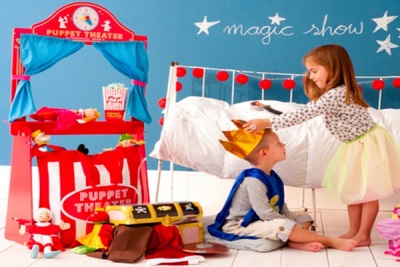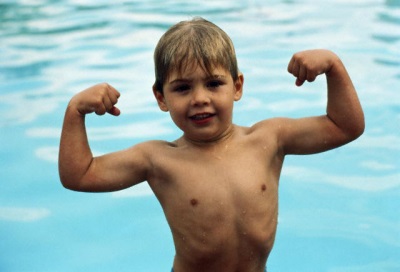Preparing for school: what activities will help your child adapt faster in school?
If you are going to send your child to school, the surest step of parents should be to assess the readiness of a son or daughter for such changes in life. This will help determine whether the child should go to school now or better wait another year. Also, a readiness assessment will help organize the preparation of the child correctly, given his weaknesses.
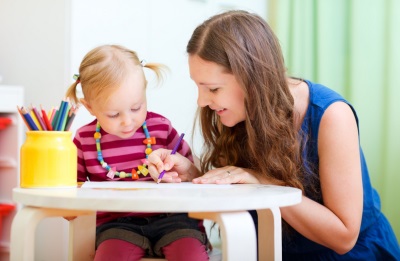
How to determine readiness?
Previously, mental development of a child was considered the main criterion for school readiness. Now the focus is on psychological readiness. She has several important criteria, among which are:
- Intellectual readiness. It determines the development of such mental functions of the child as perception, thinking, imagination and memory. For example, a child at the age of 6-7 must memorize from 3 to 5 words from the 10 words he heard, be able to find “treasures” using the room scheme, combine objects based on similar signs, and so on.
- Social readiness. The child should be able to build relationships with both peers and adults. For successful adaptation in a new team, it is important to be able to find a compromise, resolve conflicts, and be tolerant. By the age of 6-7 years, most children already know how to control their behavior and are able to follow the rules, for example, not to talk during the lesson, to listen to the teacher. If the child’s behavior in the classroom is inadequate, it means that he is not socially ready to learn. In addition, the child must have adequate self-esteem. If preschoolers rate themselves bias high, then 6-7 years old should be able to admit mistakes and adequately react to criticism.
- Personal readiness. A 7-year-old child has a need to acquire new knowledge and change his status - to become a schoolboy. Motivation can be different, for example, to be like an older brother, to carry a briefcase or not to sleep after dinner, but it is best if a child associates a school with acquiring knowledge. At the same time, it is very important to have a positive attitude towards school and an understanding of why study is needed.
For information on how to determine a child's readiness for school, see the Youtube video on the channel “Child and Family Psychology Online”.
How to prepare psychologically?
It is a huge mistake for parents to intimidate a child, for example, he is told that because of homework for playing games, he will no longer have time, at school he is waited for twos and the like. It is very important to ensure that the child does not fear school and treats it well.
Focus on the fact that he will get new friends, will learn many new and interesting things, will be able to attend various circles, will find a hobby. Share stories about your studies by telling you what subjects you liked, what kind of teacher you were, what fun happened to you during your school years.
However, one should not unnecessarily idealize schooling, painting everything in too iridescent colors. If the child does not know that difficulties and some problems are possible during training, after the first poor assessment or comment he will be greatly disappointed.
A good idea is to play a school game with a preschooler. In this game, you can simulate different situations using toys. You should also go to school with the child in advance and show him the situation. It is great if there are preparatory lessons or open doors in the selected school.
Do not forget about your own mood. It will be easier for the child to adapt at school if the parents treat the process of learning positively and show by their behavior that the new status of the child (schoolboy) is important for the family.
Possible difficulties
Lack of discipline
If a child is restless, and also does not follow the necessary rules, attending school can be a big problem. A child may not have enough patience to get things done. In this case, he needs the help of his parents — let his mother do tasks for a while with the baby.
Also, many children find it difficult to work according to the rules, and games that have some limitations will help to discipline them.
Absent-mindedness and inattention
Such qualities can greatly affect academic performance and upset parents. The child is in no hurry to carry out the task, is forgetful and often distracted. Experts do not consider such a state a psychological problem, but are associated with the predominant development of the right hemisphere. As a rule, by the age of ten, the problem of distraction disappears by itself.
To balance the work of the brain hemispheres of the child, they use finger games, drawing with fingers, sculpting, games with lacing and similar exercises.
Unwillingness to learn
To interest a child, parents need to focus on the fact that the educational process is more like a game than a duty. Support the child's curiosity and desire to learn new things that are present in it from nature. Read more about this in the article about how to instill in the child a love of learning.
Preparatory classes
Nowadays, many development centers and tutors offer classes in which the child is taught the account and reading. However, the attitude of teachers to such activities is ambiguous. Some people have a positive attitude towards them, others believe that a child should be taught how to read and write at school.
An example of the program of psychological preparation of children for school
Classes of such a preparatory course are held 6 times a week for 40 minutes a day. In the middle of each session, you should take two five-minute breaks. The duration of the preparation is 16 weeks.
Just a week the child is 4 hours. The lessons of each week include lessons for the development of voluntary attention, thinking (logical, figurative), memory (auditory, visual-figurative), perception and imagination. In addition, one lesson per week is aimed at developing the strength, mobility and flexibility of the fingers (fine hand motor skills).
A sample lesson plan might be:
|
Theme of studies |
How to do |
|
Week 1 Differences and similarities |
The child is offered to compare pictures, look for objects, find differences, read absurdities. |
|
Week 2 Missing pieces |
The child will look for the missing pieces, as well as develop the score and memory. One of the lessons is devoted to the study of the square. |
|
Week 3 Extra items |
The child is offered to draw pictures, draw shapes, look for an extra item. For the development of memory play in the "store". |
|
Week 4 Classification |
The child will look for superfluous in the pictures, classify objects, memorize phrases. |
|
Week 5 Fragments |
The child is offered to find figures and memorize drawings, to finish the fragments and the fourth figure. |
|
Week 6 Words classification |
The child will memorize words, letters and numbers, connect figures and classify them, as well as complete the construction of figures. |
|
Week 7 Comparing items |
The child is offered to find the called figures, to memorize words, to compare objects, and also to arrange icons. |
|
Week 8 Space and extra words |
The child will study geometric shapes, develop auditory memory, call the end of words, look for extra words. |
|
Week 9 Observation |
The child is offered to arrange points, look for extra pictures, quickly answer questions, define concepts. |
|
Week 10 Imagination and attention |
The child must arrange the icons, compose a fairy tale from a drawing, find the missing items, say the opposite. Also with the child spend the game "happens or does not happen." |
|
Week 11 Numbers, sequences and patterns |
The child compares the pictures and searches for numbers, draws patterns, names the correct sequence of pictures and finds the missing figures. |
|
Week 12 Copy and patterns |
The child studies the numbers and their fragments, copies the sample. There are also classes with pictures, during which the child determines their sequence, classifies them and finds a pattern. |
|
Week 13 Funny pictures |
The child is offered to read the words, to remember the story from the pictures, to continue the series, to find the missing figure. |
|
Week 14 Paired pictures |
A child is offered a lesson with the same pictures to memorize. Also, the child plays with labyrinths, remembers and finds objects, reads words, searches for patterns. |
|
Week 15 Superfluous figures |
The child examines the semantic series, studies the colors, finds the superfluous in the figure, reads proverbs. |
|
Week 16 Comparison |
The child is offered to compare pictures, find identical ones, and also compare figures. |
Material for such classes can be found in various manuals for preschoolers.
The fact that the child needs to know, to adapt to schooling is easier, look at the video channel on Youtube "Child and family psychology online."
The generalization of the material - the skill needed for each child. Watch about this in the Youtube channel video "Child and family psychology online."
For the development of the child’s ability to work on the model, watch the video of the channel on Youtube "Child and family psychology online."
Take care development of phonemic hearing on the Youtube channel video "Child and Family Psychology Online" so that the child can easily analyze words by sounds.
Games for training at home
Considering the fact that preschool children learn most easily during the game, preparatory activities at home should be based on games.
Classes for fine motor skills:
- Hatching with a pencil.
- Stringing beads or pasta.
- Drawing paints.
- Tying shoelaces.
- Cut out the paper.
- Sculpting from clay or plasticine.
- Creation of applications.
- Games with mosaic and constructor.
- Embroidery and knitting.
- Tying knots on the rope.
Games for of memory:
- Comparison of pictures.
- Remember the actions of the mother, for example, during the preparation of the dough.
- Retelling tales.
- Talk in the evening what happened the day.
- Retelling cartoon.
- A description of the item that was removed from view.
Games for attention:
- Find in the room the object whose name begins with a specific letter.
- Read the verse to the child, let him clap his hands when the word begins with a certain letter.
- Learn to do several things at once, for example, review a picture and listen to a story.
- Spread out 5 toys in front of the child, then swap them and invite the child to return them to their places.
- Give the child a leaf with groups of numbers and suggest deleting a specific number.
Games for speech:
- Call the child a word with which he will be able to form phrases, for example, you say “pie”, and the child answers “cherry pie”, “sweet pie”, “bake a pie”.
- Encourage your child to voice your actions as a journalist, for example, how you make soup or sew a button.
- Call the child the first syllable, and he will continue the word.
- Retelling cartoons, books, events of yesterday.
- Read with the child.
Thinking games:
- Speak the words the other way around (for this game, pick up words from 3-4 letters).
- Find a thing that mom called the opposite.
- Link items that mom uses at the moment, for example, what is common between a vacuum cleaner and a broom.
- Solving riddles and riddles.
- Come up with a story on the pictures.
- Make a picture of different geometric shapes.
- Make a sentence out of words.
- Make a story out of pictures.
- Draw a sequel to the comic.
- Come up with a continuation of the tale.
Spatial Games:
- Find an item in the room that Mom calls. Tell your child how to act, for example, “take a step to the right, then step forward, look up.”
- Find the item on the "map" of the room, marking it on the plan with a cross.
- Drawing numbers, letters and pictures.
- Examining maps and charts.
- Play a sea battle.
Games for emotional development:
- Mom calls the action (for example, reading, dusting or eating chocolate), and the child depicts an attitude towards him.
- Imagine that the subject came to life and tell him how he could feel, as well as his mood.
- Consider the faces of other people and evaluate their emotions.
- Reading a fairy tale, ask the child what the hero feels.
- Often talk to your child about your feelings in different situations.
Games for imagination:
- Invite the child to portray the object with the poses and gestures.
- Consider vegetables and discuss what they look like.
- The connection parts of the objects in the figure.
- Represent magnification and reduction of objects, then draw or sculpt them. For example, it may be a tiny elephant or a huge cat.
- Discuss how unusual it is to use a familiar object.
To form a child's ideas about time, conduct the classes shown in the Youtube channel video "Child and Family Psychology Online".
Daily regime
The correction of the child's day regimen is advised to take up about a month before the first classes at school. It is very important to develop a regime in which the child will sleep well, take food in time, have time to do homework, and also walk and play.
The child must understand that homework is a responsible work that is performed in the first place, and after that you can go for a walk or take on toys.
If the child attended kindergarten, problems with building a suitable regime should not arise. It is rather difficult for children who do not attend kindergarten to wake up at 7 o'clock in the morning, therefore they should be accustomed to an earlier rise in advance.
Suppose that in the morning, the child will be busy with some useful things, and leave all the entertainment and relaxation for a while after lunch. In addition, pay attention to the timely bedtime, which is also important for early awakenings.
Child health
In preparing for school, the health of a son or daughter should be given special attention. This, above all, refers to the state of immunity. In preschool institutions, hardening procedures, physical education lessons and timely vaccination are used to maintain it. If a child does not attend kindergarten, it all becomes the concern of the parents.
The child must:
- Daily walk in the fresh air.
- Eat enough foods rich in vitamins.
- Get tested by experts.
Preschool tips
- Start preparing for school should be in advance. Choose a school, a desired profile of education, meet a teacher, look at the children who attend the institution. You need to decide whether the child will go to school near the house or will go to an educational institution in another part of the city. Consider the possible difficulties, for example, if you can take a child, who will be with the child after school.
- Being engaged with the child at home, stick to the plan and conduct lessons systematically. Only through regular classes you can cover all the necessary topics evenly.
- By arranging the study space in the child’s room, allow your daughter or son to take part in this process. Let the child choose his own briefcase, stationery, clothing and other things.
How do the preparatory school lessons for children aged 6-7 take place, see the video of the channel “Children's Planet”.


